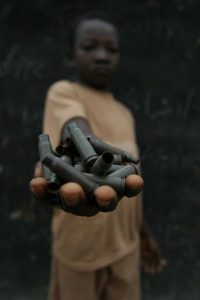 For the second year in a row, the Obama Administration is skirting a new law that prohibits U.S. security aid to countries that use child soldiers. Signed into law only three years ago by President Bush, the Child Soldier Prevention Act is designed to encourage countries to disarm, demobilize and reintegrate child soldiers by restricting security aid to those countries that employ children in their security forces.
For the second year in a row, the Obama Administration is skirting a new law that prohibits U.S. security aid to countries that use child soldiers. Signed into law only three years ago by President Bush, the Child Soldier Prevention Act is designed to encourage countries to disarm, demobilize and reintegrate child soldiers by restricting security aid to those countries that employ children in their security forces.
Last year, the administration waived restrictions on security assistance to Chad, the DR Congo, Sudan and Yemen, claiming the law was still new and these countries needed more time to remove child soldiers from their security forces. This year, the Administration has again issued exemptions for these countries. According to the the Cable, the Administration is again making similar claims to justify exemptions.
On Chad, the Administration says the country has made enough progress to merit continuing U.S. security assistance programs. The Administration issued a partial waiver for the DR Congo, supposedly limiting assistance to training for Congolese security forces. The Administration claims that South Sudan was barely a country when the latest State Department report citing child soldier abuse was issued, and thus the country doesn’t fall under the law. And on Yemen, the Administration says counter-terrorism assistance to Saleh’s government is simply too important to stop right now.
This ease with which the Administration has bypassed gutted the law for two years in a row raises an interesting question. What must the Administration do to exempt a country from this law? According to the law, the Administration may waive the application of this law to a country should the President determine “that such waiver is in the interest of the United States.” The President need only make waivers public and notify relevant congressional committees.
The Cable reported yesterday that some Members of Congress are furious and trying to prevent the Administration from doing this again next year. Rep. Jeff Fortenberry (R – NE) has already added an amendment to the Trafficking Victims Protection Act reauthorization bill that would require the Administration to give Congress 15 days notice before issuing such waivers. In the Senate, Richard Durbin (D-IL) and John Boozman (R-AR) have introduced a companion measure. This would ensure that Congress has enough time to consult with the Administration on potential waivers.
But, is that enough? The statute leaves it completely to the President to determine whether countries using child soldiers should be exempted. If President Obama, whom most believed would be a champion on human rights, has already sidestepped the law twice, imagine how this law will affect other Administrations, particularly those that care less about human rights. What good is this law if the President can issue exemptions every year and Congress can only protest?
Given that the President has primacy in foreign affairs, it’s not clear what other measures Congress could enact. Requiring two weeks notice, which would give lawmakers time to express their dissatisfaction, may be it. Of course, there is always the power of the purse. If Congress really disagrees, they can simply prevent the Administration from using appropriated funds to provide security assistance to these countries.